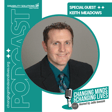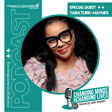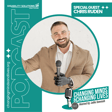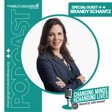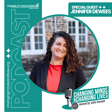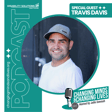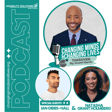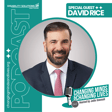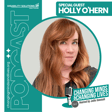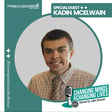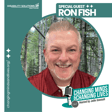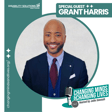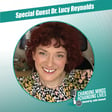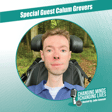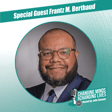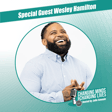Become a Creator today!Start creating today - Share your story with the world!
Start for free
00:00:00
00:00:01

CMCL Interview: Jamie Shields
Julie and Jamie have a conversation about the current state of disability employment in both the UK and in the US. They discuss how government policies and shortcomings are affecting the global disability community and delve into what employers can do to be genuinely impactful in disability inclusion.
Transcript
Introduction & Previous Episode Recap
00:00:00
Speaker
All right, welcome to another episode of Changing Minds and Changing Lives. My name is Julie Sewash. I am still the Executive Director of Disability Solutions, and I am so happy that you all have joined us for another episode today. I just want to take a second and thank Andrea Dezel, CEO and founder of The Seated Physician for joining us on our last episode.
00:00:22
Speaker
It was just a fantastic conversation with such a powerful voice in not just our community, but the healthcare community. And if you haven't listened, I definitely want you to go back and take a quick listen. It's about 25 minute conversation. She is phenomenal, new to me. So hopefully new to you as well and a great new connect.
Upcoming Guests Announcement
00:00:41
Speaker
I am also so, so, so, so, so excited to announce that Wes Hamilton of Queer Eye fame and founder of disabled, but not really.
00:00:50
Speaker
has agreed to join us on a future episode of the podcast. I am a complete fangirl, if that's not obvious. And if you have not seen Wes's Queer Eye or know anything about his amazing network of gyms across the country that are for people with disabilities, we will put in the show notes a link to that episode of Queer Eye and a link to Wes's page about him and about his gym. So amazing.
Meet Jamie Shields
00:01:18
Speaker
But today,
00:01:19
Speaker
I am also very excited to welcome Jamie Shields, who I have to tell you, there are several people on my team at Disability Solutions who are fangirling over Jamie and love the work and the content that you've been putting out over the last year or so. Jamie is our first guest from across the pond. He's joining us from Belfast, Northern Ireland today.
00:01:42
Speaker
Jamie is the CEO and founder of Disabled by Society, disabledbysociety.com, if you want to check it out. He's been recognized as one of the 100 most influential disabled people in the UK and is on the Diversity Power List, which sounds awesome, that recognizes the best of the best DEI champions across the UK. Welcome to Changing Minds, Changing Lives, Jamie.
00:02:06
Speaker
Thank you so much for having me. When I was listening to you give that introduction, firstly, I'm obsessed with Queer Eye as well. So I'm so jealous. I'll be listening to that episode. But secondly, that bio makes me sound amazing. So thank you. Well, I just read it. You did the work. So you seem pretty amazing. So give me your 30 second Twitter bio. Who is Jamie Shields? Tell me a little bit more about you.
00:02:33
Speaker
Yes, so I described myself as a registered blind, or DHD rhino, because I'm autistic, I made DHD. Apparently, I track disabilities like Pokemon cards. The older I get, the more I learn about myself. And I essentially help brands make inclusive, accessible change.
00:02:51
Speaker
So I love, we were exchanging emails when we were getting ready to do this podcast together and I love your signature line. And so I just want to catch that again. Tell me what your signature line says because you just said it to me.
00:03:04
Speaker
registered blind or ADHD rhino because rhinos are just chubby unicorns. Thank you. So in America, that means Republican in name only. So I've been trying to ponder what that could possibly mean, the rhino part, for several weeks. So thank you for joining us. I'm so, so
UK vs US Disability Employment Practices
00:03:23
Speaker
excited. You have such an interesting background that really speaks to just
00:03:28
Speaker
on my passion and our passion at Disability Solutions about helping companies really hire people with disabilities, really retain and grow that talent. And you know, that's really where your background is too. And you know, so from our, the companies that we work with and American TA leaders that I talk to on a regular basis, it seems to be like there's a
00:03:53
Speaker
pretty good deal of interest in hiring and figuring out sort of how does the UK work for hiring people with disabilities. And a lot of times I feel like the UK is doing better than we are as Americans, which I don't love to say, but I do feel like is true. You know, kind of from your perspective, just I would say both your lived perspective, but also your professional
00:04:19
Speaker
kind of your business and consulting perspective, how is the UK doing? And specifically, how is Northern Ireland doing? Yeah, I think I'll always, I always preface this question by saying, I think this parts of the world that do so much better than other countries, like, for example, Germany, they have a such a better support for disabled person with unemployment, it's harder to dismiss a disabled person.
00:04:45
Speaker
they have tax benefits, they have an earlier retirement age, and there's proper laws and places to really support that individual, whereas we don't have that in the UK. So I always say, there's parts of the world that are really good, but I think we just need to kind of come together better globally, really kind of show our notes and say, what is best practice?
Impact of Politics on Disability Support
00:05:05
Speaker
So for me, I think the UK
00:05:08
Speaker
I think we do some things right and I think a lot of what we do and what we see is actually quite performative. So, for example, within the UK we have what's called a disability confidence scheme, which is a government-led scheme that is meant to help employers attract and retain disabled talent. There's three levels of accreditation. Level one is you sign up and it's a commitment. We're going to hire disabled people and we're going to retain them, which sounds great.
00:05:33
Speaker
Level two is a self-assessment, which is you declaring yourself a confident employer. We are confident during these actions. And then to get to level three, you have to go get a self-assessment, sorry, an assessment through a third party. So that third party could be somebody else who is disability confident. It could be a client, it could be a friend, or it may be somebody that you've just outsourced completely to. Is it a confidence scheme and does it install confidence in disabled job seekers? That is no.
00:06:02
Speaker
Okay. Typically for the levels one and two, we see a lot of performance for work in the space. There's no mandatory reporting. There's nobody kind of coming in and checking in and this and saying, what are you actually doing to retain this accreditation? So I think
00:06:17
Speaker
In theory it sounds great but I think in reality we don't see that action and I think as well if we look at particularly with Northern Ireland, I think Northern Ireland is such a so little gemstone of the world with its colourful history but when we look at the current state of Northern Ireland we have our own government so we don't take mandate from the UK government.
00:06:41
Speaker
We have our own government to decide how those laws will kind of shape and maybe be changed to kind of seek Northern Ireland, which is performed under the Good Friday Agreement. However, we haven't had a working government until last week for almost, I think, five years. Five years? It might actually be longer. There was a political back.
00:06:59
Speaker
I'm trying to translate the right word. A political game where parties didn't want to sit in government together because of one party was predominantly Catholic, the other was predominantly Protestant. And for the first time in history, we had a predominantly Catholic party be elected as punished minister. The other party who's always a party didn't like that.
00:07:17
Speaker
So there's been a lot of games going on and unfortunately Northern Ireland has just kind of slipped onto the radar. We haven't worked in government now though as of last week, so it's amazing.
Employment Challenges for Disabled Individuals
00:07:27
Speaker
Congratulations. A lot has to be caught up, you know, if we look at things in particularly around the neurodiverse space even in
00:07:34
Speaker
Northern Ireland, for Northern Ireland to get a referral, to get an assessment for ADHD or autism or any other kind of neurodivergence, you could be waiting three plus years. If you want to get an Ivert, the private waiting list of two plus years. And I think for me,
00:07:49
Speaker
that is such a big challenge and I'm not saying the UK has it perfect because the UK is just as bad as parts of the UK with seven years but I think when we look at the UK we start to kind of go beneath the what are governments are putting out there or what we see on social media I think when you start to really look beneath the brain you notice so many feelings and things have been done to a standard that has been quite performative so I think there's a lot of work that needs to go on and I think everywhere has that I think
00:08:16
Speaker
We are always our own. We're critiquing away, aren't we? When you live something in your daily, you're easier to critique it. But I think some of the good that we see is, I think we see a lot of advocates standing up in the UK now, a lot of different organisations forming, who are saying enough is enough, you have had the chance as a government to fix this, and you haven't went beyond. In fact, our government just got rid of our Disability Minister, but that's a whole other story, and I'm going to keep you in a journey already.
00:08:45
Speaker
So I swear we could probably talk for an hour just on what you just said because it was a rich amount of information. A lot of it I hadn't quite put together and some of it I did know. One thing that you said that really caught me is the performative. And so in America we have companies that pay hundreds of thousands of dollars
00:09:13
Speaker
to do a self-assessment.
00:09:15
Speaker
on how great of a disability inclusive employer they are. And when we talk to our clients, I'm like, you know what? That is a really great PR activity. It's a fantastic PR activity. And when you're actually hiring people with disabilities and you've got your disability kind of ducks in a row inside your company, then that's a great time to have that conversation. But no company on the planet should be getting 100%. And they shouldn't be getting 100% year over year. It's such,
00:09:45
Speaker
I know what we're talking about. I know what the accreditation that is because I am based in the UK, but I work full time for a company as long as at the side of being a founder and CEO, need to get used to sense CEO there. But for me, I work globally as our recruitment or just a disability and accessibility lead. And I think for me, the shift with clients in this space, when they see these accreditations or these awards or scales of awards and they jump for it,
00:10:14
Speaker
But you haven't done the work. If you haven't done the work, how do you expect the place to hide a list? And then they end up missing. Yes, you haven't done the work. I mean, and that's the perfect way to say it because like we kind of we say this is a lifetime's worth of work. And if you think you finished, you failed to keep going. And so I think that, you know, we are seeing not only kind of a rise in America in the same way of that sort of
00:10:41
Speaker
We're tired of you slapping on a badge. We're tired of you doing XYZ that you paid a lot of money for. I want to see numbers. I want to see hires. I want to see retention. And that is actually what matters. And the other thing that you said that I really, I think is so important that is missed.
00:11:05
Speaker
I would say almost universally by whether it's government or it's corporations is that they never think about us at the beginning.
00:11:15
Speaker
There's always this like, hey, we're putting in a new applicant tracking system. Hey, we're doing all of these DEI things. And they go, oh yeah, those disabled folks, they probably, maybe like 10 months after we started, 10 years after we started. And then even more holistically, how you mentioned Germany and the things that they do.
00:11:39
Speaker
as a population that helps support people with disabilities much sooner in their lives and more holistically. So a lot of times I'm talking to companies now and I'm going, hey, you know what? Union rights are disability rights. Labor rights are disability rights. Return to office policies are impacting disability rights, healthcare, all those things. And to kind of come back to the UK, if I can full circle this,
00:12:08
Speaker
little journey that we're on here for a second. Um, a lot of my friends who primarily live in England, um, have been talking to me about how alarmed they are lately about some of the, the moves that the current prime minister, Richie Sunak, um, has or is putting in place regarding sort of removal of certain legal protections for people with disabilities who either are not able to work or haven't found a disability confident employer yet.
00:12:36
Speaker
Can you speak to what you're seeing from Richie Sunak and if I'm correct, the Labor Party and how that's sort of changing the employment conversation for you guys?
00:12:47
Speaker
Yeah, I think for me, what's helpful, and I'm not surprised, and this is the thing, I think when we see governments act out like this, I think, why are we surprised? We just have to look at the behaviours of what they're doing to other marginalised identities. And you know, we've seen this Prime Minister, who, by the way, isn't elected Prime Minister, we didn't choose him, his party chose him. So he wasn't actually elected by the people, because that party hasn't been able to put a leader in place, and Dunkey knows how it all.
00:13:13
Speaker
But for me, I look at it and I think, well, look what they've been doing to the trans community. You know, we had the global headlines around the death of Breonna Gray, who was murdered for being a trans young person. But yet the prime minister sat in the chamber last week. All his parents were in the chamber and openly made a comment that disregarded, it was basically around identity and how we were confusing female identity. And it was just like, this child's parents are in the gallery and you are openly being transphobic.
00:13:42
Speaker
and then we look at the party and the behaviours of going on with the party, and then I think to myself, are we surprised? We are coming up to general action. This party is trying to now converse and sway the very hard extreme right to show we're not taking DI anymore, we're not dealing with trans rights or disability rights, and I think to myself again,
00:14:04
Speaker
why are we surprised? Like we've seen this slowly build and then I think when it comes in the facts, now there's the fact in the disabled community and you'd said it before you know you can't just have one right and deny the rights of another, trans rights or disabled rights, your rights as a LGBTQIA plus person is still disabled rights, these rights all intersect and that's where we need to be looking at disability through that intersectional lens but for me there's I think I see a fear and I think of my own journey so I
00:14:34
Speaker
have been very privileged. I have a job now four and a half years. I now have my own side business, but I struggled for all of my life. I had more jobs than hot dinners. I struggled to retain and gain employment. I was ghosted. I was rejected. I was, we can't be disabled or we don't hire disabled people. So this attitude is already there.
00:14:53
Speaker
And for me, I look back at that and I think, do I see an improvement from when I'm four and a half years ago to now in the job market or the scale of the employment market? And I don't, it's exactly the same. I have friends who still consider the same process, friends who get rejected because they've asked for that adjustment or accommodation, which by the way, we know is illegal, but there's no paper trail for this. So I think
00:15:18
Speaker
For me, I see the fear and I see what the government's trying to do. I see it as almost like a scare tactic by them to scare to save people into work when they think it's this really easy thing that we can do, when they don't actually acknowledge the fact or sit down and listen to disabled job seekers or people who have struggled. They haven't listened to that they've experienced what it's saying. Well, actually, it's not that we don't want these jobs. It's that we're trying and we're failing.
Internalized Ableism & Mental Health
00:15:42
Speaker
They're not accessible. They're not inclusive. And when we do come and try to apply, we're rejected.
00:15:47
Speaker
once as soon as we share. So I think the government here is I think for me it's a part of a bigger crackdown on DEI within the UK because they're trying to get those votes but I think if this party is voted out I really hope this next government comes in and steps in because we cannot mandate disabled people to be going to offices to work in if they're going to struggle to retain that employment because it's all well and good to have it but you've got to be able to upskill us, develop us, promote us
00:16:17
Speaker
Because again, it all comes down to that performance. And for me, I'm 34 now, and I know I don't look over 21. But for myself, I think I didn't get promoted until I was over 30. I didn't know what it meant to feel belonging in the workplace.
00:16:35
Speaker
And it wasn't through one to try it because I would take any job. I had so many jobs in call centers, which I could never use the systems. I didn't get adjustments, but I tried. And I think if the mental health implications are hard to me, as a disabled person,
00:16:52
Speaker
I wouldn't wish that in anybody. So do we really want to get into a place where we're pushing disabled people into roles that are not going to fulfill them, that are not going to stay in them, and how do we support the backlash that, how do we support what will become a national crisis with the impact and psychological trauma that is able internalized ableism? Because that's all we're going to foster in those individuals. They will struggle. So while we're in the dancer, this government, I think,
00:17:18
Speaker
I don't know if I'd say this, but I hope it's okay, but we need to go. Oh, please. I want you to say exactly what you think. And I just happen to agree. I was in London for TA Tech in December and I saw Sunak's conference on the immigration crackdown and it was terrifying and had dinner with a friend who is
00:17:44
Speaker
who lives just in London and he's blind. And he kind of started talking to me about how they're going to be changing these policies and these employment schemes. And I think that
00:17:57
Speaker
I saw him go through this journey and he got a job about a year ago with an amazing company, but it was two years that honestly, I worried about him on a regular basis because he was applying and applying. We redid his resume or his CV. We did all of the things and there was no reason for him not to have a job other than that every time he walked in to an interview,
00:18:26
Speaker
that the hiring manager just completely shut down. I think pushing that back into, I love the way that you brought that together on the internalized ableism to continuously force people into situations where they're not going to be successful, is going to drive up mental health issues, suicides, those types of things that we are so
00:18:54
Speaker
vulnerable to as people who live with disabilities in ways that people without disabilities also experienced but can't understand in the same lived experience. So I appreciate you full disclosure for the audience. I asked Jamie before if we could have like a mini political conversation because this is such interesting kind of connotations for me.
00:19:16
Speaker
as well as just being a political junkie. So I appreciate you indulging me. Well, here in many times, as I said, open book, I will throw everything out of conversation and play the kitchen sink. But I think it's so important,
Beyond Employment: Disability in Society
00:19:29
Speaker
though. I think this is what we don't see enough in this space, though, is that we don't see disabled people talking about politics. We don't see disabled people talking about sex. We don't see them talk about relationships. It's like we are scapegoated to this one conversation around employment. And it's just like, well,
00:19:43
Speaker
We're being impacted in all these other areas of society. Bring us into the conversation. We're not just your disabled speaker for disabled events. Disabled experience is part of the human experience. Invite us to everything. Yes. And so, you know, I love that because so often in America, again, we have National Disability Employment Awareness Month, and that's what companies always use to celebrate as their heritage month for people with disabilities.
00:20:11
Speaker
And when it started in like, I think it was like just after world war two, it was called hire the handicapped week, which was great. Um, but I would get so frustrated with companies. I'm like, guys, it's disability employment month. And you're not talking about.
00:20:29
Speaker
us as people humanly, as a holistic version of a person who wants to get to work, yes, who wants to be able to raise their family, who wants to get married, who wants to go to the club on Friday night, whatever they want to do is just treated as this one dimensional thing of employment. And we've seen kind of a shift, I would say over the last couple of years to Disability Pride Month, which I think is
00:20:59
Speaker
still too performative, but it's showing us that we're making a step in the right direction in terms of the conversation, and that's what has to change first. Are you seeing that shift in your world at all, or is it still very much that employment-only focus? I think Disability Pride Month is a really interesting one because it originated in the US, and we're now seeing that kind of been knocked out and rolled out across the world.
00:21:24
Speaker
This stands for pride, and I feel the same as you. In the companies I've worked in, we call them milestones, and I've always thought, well, these are really performative, because we're just getting people to talk about the topic, and we're not saying actual action. And so when I became a ERG lead, my first mission was to try to actually make action here. So I think every milestone that we've ever celebrated, and I think we celebrate a few across the year now, New Year Diversity Celebration Week, Disability Pride Month, International Day of Persons with Disability,
00:21:54
Speaker
I'm probably missing one, National Disability Employment Awareness Month. You know, these medicines, what we actually targeted to do was how do we get our colleagues to actually talk about what they want to see?
00:22:03
Speaker
do we educate about the barriers that people will never understand or how do we break down a conversation that unless you've lived experience, you're not going to be able to fully engage or participate with. So we created learning videos so that each milestone there will be a certain amount of educational resources created before we would even consider starting the panel. But I also think for disability pride month it's
00:22:26
Speaker
we started staying in the UK and we last year had an expedition for the first time which was done by Disability Expo and they held together this three-day conference and there was thousands of disabled people who came together to kind of share and talk and there was panels and it was all singing and dancing and it was really great
00:22:46
Speaker
and I think I like to see that as where's the community in these events because that's the problem is we don't see ourselves before employment and it's the same in the UK you know a lot of the support even that you go out and if you're at these kind of conventions or expeditions a lot of the support is aimed towards a certain type of disability a physical disability a wheelchair user and then I think of people with myself I'm like
00:23:09
Speaker
was always good for me to go and support these things, but what do I take away from this as a registered blind person? What support have I run into? Or what incredible adjustment that I've never seen before? And it doesn't happen. So I think the
00:23:25
Speaker
There's a gap of knowledge that people still feel to understand the diversity of disability or the complexity of disability and I think behind these milestones I wish that we would push that education out more than the, I don't care what your CEO is going to say on disability pride
00:23:44
Speaker
I don't care what they're going to say in a panel on International Day. I want to know what your colleagues are saying. I want to see what you're doing, because for me, those milestones are, and this is what I advise my clients, is they're not tick-boxed. Yes, they're done. They're reflections. Okay, so International Day is your end of the year. What have you done in the past 12 months? What did you target yourself on last year? And what have you got to? Disability Pride Month. I know it's seven months into the year, but I would say that's your midpoint. Look what you've done at the start of that month.
00:24:13
Speaker
review it with your colleagues and for the next six months steer it. So yes, use these milestones because the opportunities I think they create for people like myself or speakers or people who are trainers who are unlike Den and like use this to bring those people in, but equally make sure what you're working on is actually driving change. So I would offer a tangent there, but I think I'll summarize by saying that I think these milestones are important and I think in the UK,
00:24:40
Speaker
We didn't have as many for disability, but I think last year was probably the first year in a very long time I've seen a boom with Disability Pride Month. And I loved it because I just love seeing these companies actually hiring disabled people and my clients themselves bringing in people to speak or, as I said, to create resources. And I look at those resources now in January and just the other day at some of the email and say, can we use these resources with clients? And I thought, no, but we can make them with your client. So it's a conversation starter as well.
00:25:11
Speaker
Go warm with your intent. Don't just celebrate for the sake of having a milestone. It needs to really be a reflection, an action, or a commitment to what's next to come. No, I love that. And I felt the same way about disability resource groups. When I first got into this world, you know, 10 or so years ago,
00:25:32
Speaker
I thought, oh my God, they're going to throw picnics and they're doing this and they're doing that. And yes, some of them are, but at least they're brave enough to have a conversation and to recognize the community.
Disability Pride Month & Resource Groups
00:25:45
Speaker
But then you see some that are just doing the most incredible work that are led by people with disabilities, not by parents and caregivers, which definitely have a place.
00:25:57
Speaker
But it's like it is actually a disability-led conversation. And I think it really has kind of shifted the conversation, at least in the US, to something that is more like, hey, I'm sitting right here. Don't talk about me in the third person. And I think that's where I've really grown to love the power of a disability resource or an employee resource group, kind of however you talk about it.
00:26:21
Speaker
Um, you know, so just from your, you, you were, correct me if I'm wrong, your day job, your day gig is your, you work in recruitment and you work as a leader within a disability resource group. Is that right?
00:26:36
Speaker
So that's where my role started. I actually retired as a disability ERG lead. This month, sorry, last month, it's February now, or more technically, what month it is. So when I did this ERG lead, I did it for two and a half years. And it was very much led by colleagues with disabilities. And I love that you made the comment around parent caregivers, because I think what happens in these spaces is when we don't have the colleagues
00:27:01
Speaker
who feel comfortable to share or step into these positions, what we see is parents step into these positions or caregivers and then what we see happen is very, which I call fluffy language around disability, which is we become inspirational people or inspiring superheroes or definitely abled and
00:27:20
Speaker
I think you can usually tell what ERGs have been named by the disabled community or somebody with experience over caregivers. Spoiler alert, they went to work once because my clients might come chasing me. But I think for me, it's having that lived experience. I came into that role two and a half years ago and
00:27:36
Speaker
that ERG there was a community there but there wasn't real action and I think the momentum that we've seen in the past two and a half years we became an award within ERG which sounds really fancy but like for me I cried when we found out because I was just like how did we do this and I then had to stop and actually start to reflect on what we had done and I looked at the state of the organization when I started
00:27:58
Speaker
And then I looked at it after we had won the award and the conversations, not just from leaders or a CEO, from colleagues and other teams coming in to learn about disability or asking to join it as an ally. We've seen that membership increase, I think, 67% in the first year that we were there. And it's like,
00:28:16
Speaker
the impact that you can have when you have actual people of experience behind the conversation is incredible. And we had a parents and caregivers group who worked at the side of the ERG and created that space for parents and caregivers, because one of the things I think we kept taking feedback was, I love hearing these panels, but I don't like to hear a parent talking about disability in this way, because it's interfering with this person's story. And I think there's a space for both, we have to respect that space. And I think it's just about how you mitigate it. But for me, I think an ERG
00:28:44
Speaker
or Employee Network, whatever you call it, ERJ is just Employee Resource Group. For me, there's a real sense of community. But for me, it was empowerment. Because before I came into the workplace, I, as I said, I struggled. I had so much internalised ableism. I had suffered with my mental health. I had
00:29:03
Speaker
I think I should do a warning here. I had bench strength, I had self-harm, I had a type of suicide and the cause of that was my identity, was my disability, was my sexuality and the fact that I didn't feel belonging. But becoming an ERG lead
00:29:18
Speaker
It gave me this confidence to talk about my disability in a way that I had never done before. And I think because there was a group of people in our community who I wanted to feel psychologically safe, and that's based to talk about theirs. And when I looked the last week in there, we ran in January, when I passed over the new lead.
00:29:34
Speaker
We have colleagues who come on those calls and now will say, this manager's done X, Y, Z, and it's not right. How do we fix it? And before you know it, you have all these different colleagues who have lived experience stepping up. And it's not just like your empty level roles, your band one, your band two. There's managers that are talking about their experience with autism.
00:29:50
Speaker
and we did a video with one manager who explained autism and he gave the most beautiful definition of what it was like to be autistic and as an autistic person I am obsessed and it was as an autistic person you're walking alongside and you're a typical person who's wearing shoes and socks however being autistic you're actually walking on the beach where your feet burn you're feeling the sand beneath you so everything's just a very different feel
00:30:14
Speaker
and we did this video and launched it, and the impact of that and seeing actual representation was incredible. So for me, I think ERGs, you have to support them. You can't just stop these groups and expect them to take care of themselves. You need to be given them budget. You need to be given those leaders' time because you cannot manage a day job, manage your disability, and manage an ERG. You need time carved out. And I got very lucky because I
00:30:39
Speaker
I don't want to say I threatened to quit, but I wanted to work with a DI, and I said to my DI director, if I can't get a real DI at this company, I'm going to have to leave, because I've now had a taste of what it's like to be in a lead, and my role became of my permanent
00:30:53
Speaker
role. I took you to Jarny here. You asked me about being the RG lead and I've given you the kitchen sink. No, I just, no, I'm mesmerized. So one, I want to say thank you for sharing that part of yourself because I know even though we have this privilege of being able to talk about who we are in a way that a lot of people don't, it means so much to someone who lives with mental illness, who lives with, you know, cognitive processing disorders and all those things to hear
00:31:23
Speaker
someone else share that story. And I know how impactful it is to people.
Personal Journey: Embracing Identity
00:31:29
Speaker
And so I kind of want to wrap up before I ask my final two questions. One thing that I love that you do is that you do share your whole self. So you are talk about just on your website, the intersectionality of being a gay, disabled man. Can you kind of
00:31:48
Speaker
take us a little bit on that journey. I don't want to steer you any direction. I just want to kind of hear about how you became your whole self and how you got to a place where you were really comfortable sharing all of that so publicly. Yeah, so again, growing up in Northern Ireland, like I said, colorful history, you can't be any kind of different in Northern Ireland, apart from your religion. It was always, are you casting a person? You would never be asked if you're disabled over your sexuality, but you couldn't be gay or different in the community because
00:32:18
Speaker
it wasn't okay in Northern Ireland growing up. And in fact, a lot of politicians, I think it wasn't until like 2018-19, we actually were able to legally marry as gay individuals in Northern Ireland or same-sex couples. And the UK had that a few years before. Decide to Ireland, which although we're connected, it's completely different, comes to you, and as part of the EU, we're no longer. Find complicated geography.
00:32:42
Speaker
But for me, I grew up knowing that being gay was something you couldn't be. I grew up knowing that being disabled was this horrible, shameful thing not to talk about because people were treating me differently for that. But when I was being bullied in school for being disabled, I was being bullied for being disabled, kids then started calling me gay boy.
00:33:00
Speaker
which confused me because obviously I was already struggling with being disabled bringing in the additional struggles of being gay just kind of complicated things so I struggled to communicate how I was feeling I struggled to
00:33:16
Speaker
except that I was gay and even at like 15, 16, I still had a girlfriend and I was very much gay. I knew I was gay in my heart but I wanted, it was like keeping up with the Jones's appearance and I was, I was still very much, and I know it's probably gonna sound silly, but I was still very much a child thinking at that age, though if you think a 15 year old now,
00:33:34
Speaker
They are out in the foams. They're looking to go drinking behind everybody's back. They're miniature adults. Whereas when I was at the age, I didn't have that mentality. I would go out with my friends. And when I say friends, it was like these two guys who played football. So I didn't actually really was a friend because they couldn't play football. But they would bring me around with them. And I would kind of just follow them around. And I had this girlfriend. But I would go home and play with my action man and Barbie with my sister. And I would play with my figurines because I didn't have the social skills. So I was masking someone to keep up.
00:34:03
Speaker
So I think the breaking point for me was what I mentioned earlier about my own history of mental health. It was after that incident, I sat down and had a conversation with my mommy and I said, you can tell I'm my actual mommy. I said to my mom, I really don't like who I am as a person. I don't want to be gay. I don't want to be disabled.
00:34:24
Speaker
and like it was a very deep conversation and I was sitting with a bandage and my riffs and things and it was a very dramatic conversation but my mum was just like you can't change who you are and she's just like so stop trying to change the world the world needs to change for you um and it was it was very deep but I kind of felt tears in my eyes going there so I'm not crying but I think for me it was it was a very difficult journey to get to the point of knowing that it was okay to be gay it was okay to be disabled and I think that the practice that then came with that when I started to accept myself was
00:34:53
Speaker
how do you come out and then come out again? It's like how you're gay and I'm disabled and what is that then? So I think for me that lesson was a hard lesson to learn of loving yourself or as RuPaul says how the hell can you love somebody else if you can't love yourself and I really do believe that because that's the shit with who I am but I think when I look back on anybody and intersectionality in particular I think because of the experiences I went through of being gay and disabled
00:35:20
Speaker
I think that's why I'm a little bit more open to understanding and stopping and saying, well, actually, we can't come with disability through just this white lens. We have to hear the intersectional experiences. We need to have portals that are diverse. And, you know, it's one of the things I pride myself on is, not pride myself, but I'm very
00:35:37
Speaker
rigid with myself, if you will. Somebody invited me to a panel, and I know it's an all-white panel. I'm not getting on that panel because our experience is, yes, we have different disabilities, but where are we bringing in intersectionality? If it's all a straight panel, and we're talking about LGBT History Month, it's like, well, that's not going to really cover it. So I think, or I've been in panels where they've talked about intersectionality, and it's all white people as well, and I think
00:36:00
Speaker
We have to get to the stage where we understand that disability is not binary. Diversity has no one appearance. You can't define diversity with one person. So, when we talk about disability, we have to bring in those lenses because the experiences I feel as a disabled white gay man, it's going to be extremely different to have black disabled gay persons going to fail. So, taking a journey there, I got a wee bit emotional, but yeah.
00:36:24
Speaker
I will tell you, so I am the mom of a gay young man who I, if I'm like, if your mom is like me was like, yeah, dude, I knew that like from years, I just couldn't get it on you to figure it out. And so thank you to your mom for being amazing. Um, because that's so critically important, um, to have that acceptance from your parents. So you, that is, that is a blessing. Um, and I got a little teary eye kind of remembering that moment with my son.
00:36:51
Speaker
Um, so, but I thank you. It's so important. We again, like employment, we see people with disabilities as only their disability. And we are a whole bunch of other things that we also want to celebrate and live.
Advice for Leaders on Disability Inclusion
00:37:05
Speaker
Um, so last two questions, because even though this is a new podcast, I am trying to end every interview with two questions. The first one, what is something that you would tell a hiring leader?
00:37:22
Speaker
whether it's frontline or CEO, that would change their mind about hiring people with disabilities. Yeah, I think I don't say I like to scare people, but I like to remind people of the fact that we see disability as this far away experience. It's never going to come knocking our door, or we don't have to worry about. And what we actually feel to realize is that disability is very much part of the human experience.
00:37:48
Speaker
We will all experience either temporary or permanent disability. We look at the statistics, 70% of people are, 80% of people require the disability as opposed to 20% born with it. So disability will impact you sometime. You may be, boom, we're aging. There's so many different scenarios, but equally, if it's not you, it could be your partner. It could be your child.
00:38:10
Speaker
It could be your grandson, your grandchild, or it could be your best friend. So it's not about making a case for why we should make things inclusive for disabled people. It's a case of why aren't we future falling for your potential friends and family who are going to come through these doors. Love it. So what is one thing, one action that happened in your life that helped change your life? And you have shared a lot already. So you might just skip this question, but I, if you want to share something else, I want to hear so much.
00:38:40
Speaker
I think one action that has changed my life, and to be honest, I'm going to be really cheesy, is my partner. And I know it sounds really cheesy because for me, when I think I've been my partner, quite a bit of fashion, only six, seven years, I'm still lowering, I know. Maybe this year, this year.
00:38:58
Speaker
But I think when I think about who I was, and I know this is probably gonna be a real cliche, but I was pretty much blindly wandering and I didn't know what it was what it was like to have a relationship. This is my first real adult relationship. And to find somebody who was also newly divergent and autistic as well, we went through that journey together.
00:39:17
Speaker
I think that was the pivotal moment of probably our relationship and probably my life is that I know I have a partner who gets it. And I call in my eyes because he does things to me when I ever have him to ask. And Yuri loved him because we were at a restaurant and he said, he took the man and he just read it to me before I had to even ask and say, could you read this to me? So to me, that's what love is. It's this little silly act. So the moment that changed my life is my partner because behind, you know that saying behind every good woman is a man or
00:39:45
Speaker
behind of a good man is what I don't even know what the saying is, but for me, I'm like behind of E. Reynolds is a man because he's the person that he has me make change with myself and challenges me in ways that I don't think anybody else could. So my partner is the thing that changed my life, I think. Amazing. Amazing. Amazing. Such a cliche. No, I love it. Trust me. We have a lot in common. I'll tell you that. Jamie Shields, CEO and founder of Disabled By Society. Where can people find you on the socials?
00:40:16
Speaker
Yes, so on LinkedIn, it's just my name, Jamie Shields, or Disabled by Society. It's my business page. I do have Twitter. No, it's not Disabled by Society because it's hard to look too long. So it's this by Society on Twitter. And if you want to check out my website, just disablebysociety.com. But yeah, reach out whatever you feel best to you or most accessible to you. Awesome. Amazing. Thank you so much, Shami. Thank you all for joining us for what will probably be one of my favorite conversations of 2024. Until next time.
00:41:09
Speaker
We'll see you. Thank you so much. Thank you
